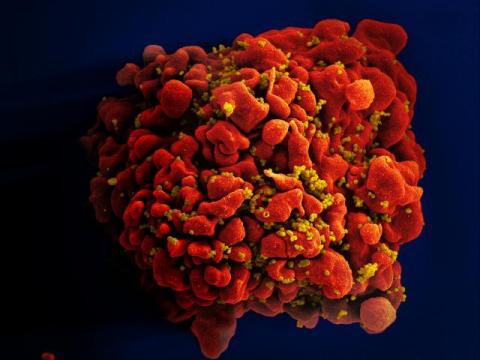Why we still need to talk about AIDS

In 1347, Siena, a flourishing, beautiful city-state on Tuscany hills, was a leading world power for its age. Just one year later, plague had already killed almost half of its inhabitants, changing its history forever. That did not happen only there: the impact of the Black Death – as the Middle Age epidemic was named – involved all Europe, with huge human, economic, political and cultural consequences. A typical, extreme, example of how infectious diseases can influence the course of history.
The memory of this catastrophe was continuously being reminded in the early Eighties of past century, when a previously unknown, and at the time inevitably deadly disease, emerged in the USA. Referring to AIDS as the 20th century’s plague surely did not help patients at that time, but it can be useful today to understand how this epidemic introduced what we call Science-in-Society issues (governance, gender, communication, participatory governance, law and ethical themes, intentionally caused outbreaks) into the public debate.
A “different” emerging disease?
AIDS did not seem to have the classic characteristics that one could foresee for an emerging infectious disease. When we think of a new virus, we usually expect acute symptoms: fever, cough, vomit, diarrhoea or, in the worst case, haemorrhages. The first people who showed the new syndrome, on the contrary, had other diverse superimposed infections or even tumours: pneumonia by Pneumocystis carinii or Kaposi’s sarcoma, for example. The unknown disease did not kill the patients directly, but compromised their immune response. It had a slower evolution than pandemic influenza, though being much more lethal, and in few years spread all over the world.
Since the first cases were diagnosed in homosexual men in California, it was suggested that the cause had to be somehow related to this kind of sexual attitudes. For the first time, the issue of gender entered the field of infectious diseases. The syndrome was therefore initially called Gay-Related Immune Deficiency (or GRID). This careless name contributed to the prejudice that this disease should not concern straight people, helping the virus to spread undisturbed through heterosexual intercourses. Even though its name was soon changed into “Acquired Immuno-Deficiency Syndrome (AIDS)”, the stigma related to the disease did not improve for many years.
Stigma does not help
The awareness that the disease was also common in people who inject drugs made part of the public think that, even though not “for gay only”, this was anyway a disease of somehow marginalized people: nothing to worry about, if you are a “proper” person with a “regular” lifestyle. The diffusion of the virus to thousands of people through infected blood did not succeed in correcting this wrong idea.
Soon, it became clear that the communication evoking “a new plague” and “plague-spreaders” did not help either. Fear appeal did not work. On the contrary, many people hesitated in having themselves tested for fear of being discriminated, and so they kept on spreading HIV without knowing they were infected. And in some cases, even if they knew their HIV positive status, they did not tell their partners, either for fear of being left alone, or even on purpose, as a reaction for being outraged.
Governance is a clue
Deniers of the link between HIV and AIDS made their part, providing the South African government with apparent proofs that the epidemic was something invented by “white-led” European and US pharma companies against African people. This governance of the crisis in South Africa caused a severe delay in treating people, which worsened the situation and caused tens of thousands of avoidable deaths.
In theory, experts have now become aware of the importance of avoiding any discriminatory reference in emerging infectious diseases, starting from naming. Any geographical, professional, ethnical or gender indication, in fact, more than unfair, can make people falsely reassured, while discouraging others to seek help.
A lesson learnt?
Nevertheless, some mistakes in communication are still occurring. Saying “swine flu” instead of A(H1N1) influenza could have had an impact on people working in pig farms and on pork sector, discouraging people from eating this kind of meat during the crisis, even without any scientific and reasonable basis for this. Calling “Middle East Respiratory Syndrome” the SARS-like emerging disease by coronavirus, as if it should regard only the Arabic countries, could have been misleading, with more severe consequences. Korean doctors, in fact, were late in recognizing it, when it appeared in a severe outbreak in their country, maybe because it is in not in Middle, but in Far East.
AIDS crisis, anyway, was a turning point also in a positive way. It caused society to have a first, strong, participated reaction. From the most diverse forms of fundraising by thousands of charities and the launch of private/public funded initiatives, to the open declaration of their own HIV-seropositivity by sport and cinema celebrities to break the stigma, the public started to feel personally involved in the response to an infectious disease. Paraphrasing the lines of EU-funded research, science is already in society, but also society is already working with and for science.
